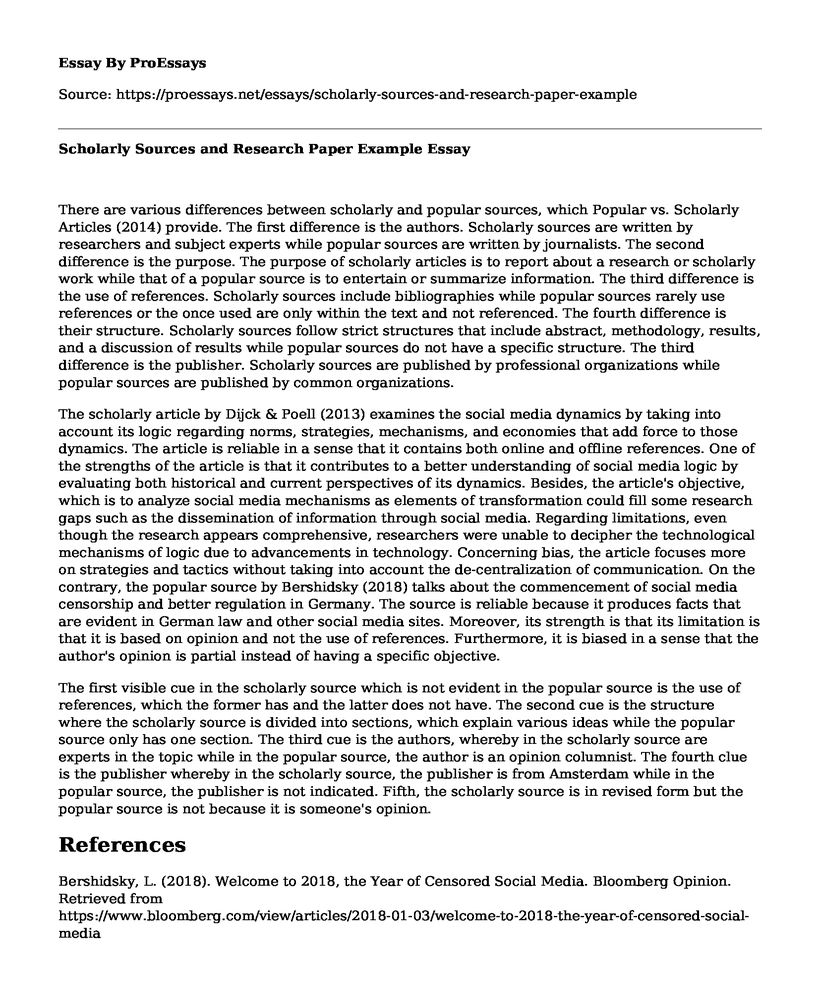There are various differences between scholarly and popular sources, which Popular vs. Scholarly Articles (2014) provide. The first difference is the authors. Scholarly sources are written by researchers and subject experts while popular sources are written by journalists. The second difference is the purpose. The purpose of scholarly articles is to report about a research or scholarly work while that of a popular source is to entertain or summarize information. The third difference is the use of references. Scholarly sources include bibliographies while popular sources rarely use references or the once used are only within the text and not referenced. The fourth difference is their structure. Scholarly sources follow strict structures that include abstract, methodology, results, and a discussion of results while popular sources do not have a specific structure. The third difference is the publisher. Scholarly sources are published by professional organizations while popular sources are published by common organizations.
The scholarly article by Dijck & Poell (2013) examines the social media dynamics by taking into account its logic regarding norms, strategies, mechanisms, and economies that add force to those dynamics. The article is reliable in a sense that it contains both online and offline references. One of the strengths of the article is that it contributes to a better understanding of social media logic by evaluating both historical and current perspectives of its dynamics. Besides, the article's objective, which is to analyze social media mechanisms as elements of transformation could fill some research gaps such as the dissemination of information through social media. Regarding limitations, even though the research appears comprehensive, researchers were unable to decipher the technological mechanisms of logic due to advancements in technology. Concerning bias, the article focuses more on strategies and tactics without taking into account the de-centralization of communication. On the contrary, the popular source by Bershidsky (2018) talks about the commencement of social media censorship and better regulation in Germany. The source is reliable because it produces facts that are evident in German law and other social media sites. Moreover, its strength is that its limitation is that it is based on opinion and not the use of references. Furthermore, it is biased in a sense that the author's opinion is partial instead of having a specific objective.
The first visible cue in the scholarly source which is not evident in the popular source is the use of references, which the former has and the latter does not have. The second cue is the structure where the scholarly source is divided into sections, which explain various ideas while the popular source only has one section. The third cue is the authors, whereby in the scholarly source are experts in the topic while in the popular source, the author is an opinion columnist. The fourth clue is the publisher whereby in the scholarly source, the publisher is from Amsterdam while in the popular source, the publisher is not indicated. Fifth, the scholarly source is in revised form but the popular source is not because it is someone's opinion.
References
Bershidsky, L. (2018). Welcome to 2018, the Year of Censored Social Media. Bloomberg Opinion. Retrieved from https://www.bloomberg.com/view/articles/2018-01-03/welcome-to-2018-the-year-of-censored-social-media
Dijck, J.V., & Poell, T. (2013). Understanding Social Media Logic. Media and Communication, vol.1, Issue 1, pp.2-14.
Popular vs. Scholarly Articles. (2014). Retrieved from https://www.siskiyous.edu/library/documents/popular_vs_scholarly_articles.pdf
Cite this page
Scholarly Sources and Research Paper Example. (2022, Jun 30). Retrieved from https://proessays.net/essays/scholarly-sources-and-research-paper-example
If you are the original author of this essay and no longer wish to have it published on the ProEssays website, please click below to request its removal:
- Grammatical Explanation of Passive Voice
- Development Theories to Life Experiences Essay
- Essay on Two-Factor Theory: Herzberg's Research and Criticisms
- Essay on a Passion for Helping Others: My Journey to Becoming a Medical Professional
- PBIS: Enhancing School Safety & Improving Positive Behaviors - Essay Sample
- Nursing Students: Professional Behaviour & Dressing Well - Essay Sample
- Essay Example on Literature Pedagogy: Transforming Teaching through Global Beliefs







